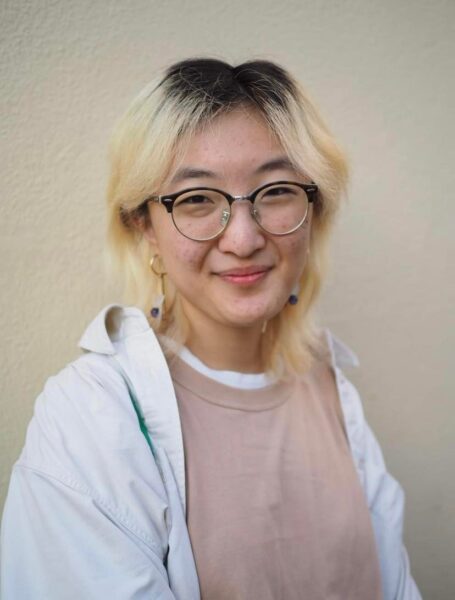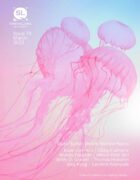I love the different elements that are woven together throughout the piece: the Tumblr piece, viral videos on Bilibili, friendship, and WeChat moments! Can you share a bit on how you plan or find yourself writing through weaving different elements such as these?
Thank you! The kernel of this piece—the first few lines—came from an informal poetry workshop I did with Korean poet Lee Hyemi and her translator, fellow writer Soje. I got a verbal prompt, “monkeys,” and I also drew a card from Hyemi’s “poetry tarot” deck that showed a bear making a painting. I immediately thought of the Tumblr post.
I’m an art historian, but a lot of my visual and day-to-day vocabulary come from online memes. That day, I drew on both aspects to write a prose poem about my ambivalence when it comes to primates, Van Gogh, the art market, and what categories like “ugly” or “valuable” really mean. I don’t like primates, but I also know that my revulsion comes from the fact that they’re so close to human beings; to me, they represent everything that’s ugly in humans, yet they’re ultimately incapable of the cruelty that we humans enact. Like many humans, I fear being bestial, so I need to maintain a hierarchic boundary between myself and animals.
At the time, I was still with my girlfriend, the “you” of this piece. Falling in love made me (feel) bestial. I recalled the scene in To Kill A Mockingbird where a rabid dog comes bounding down the street and has to be shot, not only for the safety of the neighborhood but to put the dog out of its misery. Very soon after we broke up, I found myself digging up this months-old draft from the evening with Hyemi and Soje. I realized that the issues it was sketching out told one of the stories from my relationship. This story involved me being overwhelmed by, and giving in to, my wild and unruly lesbian feelings—and understanding that these animalistic, primal traits are what makes me more human, more alive, rather than less.
Developing the piece into what it is now just involved teasing out the threads that were already there and weaving these into the narrative of a relationship. In this story of the relationship, the speaker’s central struggle is in feeling legitimate: as a human being, as a partner, and as someone with a gaze.
I never thought I’d publish a nonfiction piece about a real heartbreak. But that naked vulnerability is part of what the piece is trying to embrace.
The love-and-hate relationship is so central to this piece, and it gets elevated in December with the Rise of the Planet of the Apes moment. Do you find yourself connecting parallels between movies and reality in your own writing?
I’m enormously inspired by movies. One of my favorite directors is Jia Zhangke, who is from Shanxi province, China, like my family. In his work, the lines between fiction and nonfiction aren’t just blurred, they’re basically nonexistent. I also love Jia’s documentary-like camera work (he collaborates with cinematographer Yu Lik-wai), which involves a lot of just … setting the camera down somewhere and letting things happen in front of it, these moments of quiet that aren’t any less vivid.
In my writing, I find myself wanting to achieve a similar camera angle. What goes inside the shot, what’s left out, and what gets partially cut off at the edges are all part of a careful arrangement. Every sentence, every image, is doing work for the piece.
What was your rationale behind choosing the three months?
The relationship depicted in the piece lasted three months! Which is funny, because it felt like a whole universe was born and exploded, like empires rose and fall and rose again in that time. I also wanted to convey this sense of the seasons changing. My friend Maggie read the piece when I finished it and told me that it made her think of “a small stream in the winter,” running across the snow. I really like that: it conveys resilience, as well as sadness, but also the inevitability of certain emotions and of time passing.
I love the lines: “Isn’t it beautiful, you think, to be the same as an elephant, a dolphin, a cat. No, I reply, laughing, being human is better.” It almost felt like a conversation that is short and yet so powerful and central to this piece! Can you share a bit more on how you arrived at this point during the writing of this piece?
This is my first published creative nonfiction piece, and it’s interesting to think of what it means to reconstruct a conversation from memory.
At some point, my ex-girlfriend had the phrase “mammal” in her Instagram bio; that’s how important mammality is to her. It’s ironic, because in our dynamic, my ex-girlfriend was the calm, rational one in contrast to me being feral; yet she embraced her (physical) animality whereas I was anxious about my (moral, internal) animality. When I recalled this conversation during the writing process, everything in the piece came together.
We broke up because I felt that I was second-best in her life; I couldn’t compete with her number-one person. But in the December dream, the speaker accepts being second-best. This arc echoes the speaker’s insistence that primates are “second-best” to humans, pale imitations that will never match up to the real deal—which the speaker’s girlfriend fundamentally rejects, seeing herself as equal to animals. The speaker dreams of an alternate December where they give in to the girlfriend’s worldview, thereby feeling content.
Can you tell us about some of your current or future projects you’re planning/working on?
I’m working on a couple of stories. I’m also “writing” a “novel” about a lesbian who works in a hotel. Alongside, I still have my PhD to write, and lots of meals to cook for my friends.



 The core workshop of SmokeLong Fitness is all in writing, so you can take part from anywhere at anytime. We are excited about creating a supportive, consistent and structured environment for flash writers to work on their craft in a community. We are thrilled and proud to say that our workshop participants have won, placed, or been listed in every major flash competition. Community works.
The core workshop of SmokeLong Fitness is all in writing, so you can take part from anywhere at anytime. We are excited about creating a supportive, consistent and structured environment for flash writers to work on their craft in a community. We are thrilled and proud to say that our workshop participants have won, placed, or been listed in every major flash competition. Community works.